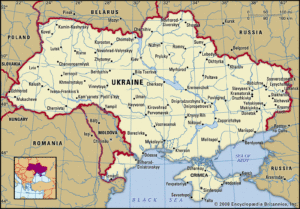Trump and Ukraine: Call it Bribery, Not Extortion
There is now overwhelming evidence that president Trump withheld Congressionally-approved aid to Ukraine to pressure that country to conduct investigations that would benefit Trump politically. As Congress begins public impeachment hearings, there is widespread disagreement over whether this conduct is best described as bribery or extortion. Based on this evidence you could say the president extorted Ukraine or you could say the president demanded a bribe from Ukraine -- both would be accurate. But for purposes of impeachment, it's better to call it bribery. Impeachment is not a criminal proceeding, and it's important not to buy into the argument that impeachment requires proof of a criminal offense. On the other hand, both bribery and extortion are in fact crimes, and deciding whether there was serious presidential misconduct justifying impeachment will inevitably be guided by reference to criminal law. In federal law, the elements of extortion by a public official and bribery are very similar. But if this were a criminal prosecution, there would be compelling legal reasons to charge bribery rather than extortion. And those same reasons, coupled with the language of the Constitution, mean that for purposes of impeachment it also is best to refer to the president’s conduct as bribery.

The Elements of Bribery
The federal bribery statute, 18 U.S.C. 201, makes it a crime for a public official to corruptly demand, seek, receive, accept, or agree to receive or accept anything of value in exchange for being influenced in the performance of an official act. In this case, the public official is president Trump. The thing of value he demanded was public investigations of his political rival Joe Biden and of a debunked conspiracy theory involving interference in the 2016 election and a computer server supposedly located in Ukraine. And the official act Trump would perform in return would be releasing the approved military aid to Ukraine. Trump's behavior toward Ukraine readily meets the elements of the bribery statute. A key factor in this charge is the breadth of the term “thing of value.” It encompasses anything of subjective value to the official that would have the potential to influence his or her behavior. Offers of future contracts or employment, sexual favors, companionship, and other intangibles all have been held to be things of value for purposes of the bribery statute. Publicly-announced investigations that would benefit Trump politically would certainly qualify. Trump’s actions in seeking the investigations, both personally and through intermediaries such as his lawyer Rudy Giuliani, amply demonstrate how personally valuable he thought Ukraine’s actions could be.
The Elements of Extortion
A person commits the crime of extortion when he induces the victim to part with something of value under some kind of duress. There are different kinds of extortion, including extortion by fear or threats of violence – the more familiar, mob-style, “pay up or we’ll break your kneecaps” scenario. But when it comes to extortion by public officials, the most commonly-charged theory is extortion "under color of official right" under a statute called the Hobbs Act, 18 U.S.C. 1951. That statute prohibits affecting interstate commerce through robbery or extortion, with extortion defined as the “obtaining of property from another, with his consent, induced by wrongful use of actual or threatened force, violence, or fear, or under color of official right.” In the 1992 case of Evans v. United States the Supreme Court held that Hobbs Act extortion under color of official right does not require any kind of express threat, demand, or shakedown by the public official. At common law, the Court held, this offense was the “rough equivalent of what we would now describe as ‘taking a bribe.’” All that is required is that the public official accept a payment to which he or she is not entitled, knowing it is being given in return for the performance of some official act. That does indeed sound just like bribery, which explains why extortion under color of official right is a common charge in cases where the conduct looks more like bribery than extortion. The facts of the Ukraine case also suggest another extortion theory under the Hobbs Act: extortion by fear. Such a charge would allege that president Trump extorted Ukraine to begin the investigations through fear of the harm that would result, economically and militarily, if the approved aid continued to be withheld. This is a more classic extortion model (“Nice little country you got here, be a shame if something happened to it"). Trump's coercive behavior toward a much weaker, vulnerable nation could readily be characterized as extortion by fear.

Was Trump’s Behavior Bribery or Extortion?
As noted above, after Evans there is little difference between charging a public official with bribery or with extortion under color of official right. In many cases, either statute could be applied. Extortion under color of official right is a common charge in cases involving bribery of state and local officials, because the federal bribery statute applies only to federal public officials. For example, Virginia Governor Bob McDonnell was charged with multiple counts of extortion under color of official right, even though the conduct in his case was best described as bribery. But a key distinction between the two charges is the legal status of the payor. In a bribery case, there generally is a two-sided, consensual transaction. The bribe payor and the bribe recipient enter into a corrupt agreement and both are culpable. The statute prohibits both sides of the transaction, and both may be charged. In an extortion case, by contrast, the person who pays is generally considered a victim rather than a willing participant. Extortion statutes do not punish the payors, who are paying under duress. That’s certainly true in a case involving extortion by violence or fear. But it’s also true in extortion under color of official right – the Hobbs Act contains no provision for charging those who are, in effect, paying bribes. As a result, the Court’s interpretation in Evans created something of an anomaly: a bribery statute that punishes only one side of the transaction. This has led prosecutors in some cases to develop creative theories to pursue the bribe payors in a Hobbs Act case, such as charging them with Hobbs Act conspiracy. This factor may suggest that extortion is a better fit for the Ukraine scenario than bribery. Ukraine certainly seems more like a victim than a willing participant. On the other hand, the bribery statute does specify that a public official may “demand” a bribe – which suggests some degree of coercion or duress. Factually, I think the Ukraine transaction could be described as either bribery or extortion. And I agree there is some force to the argument that extortion feels like a better fit, given the bullying nature of Trump’s behavior and Ukraine's coerced participation. But legally – and politically -- there are compelling factors that favor characterizing Trump's behavior as demanding a bribe.
The Hobbs Act Property Requirement
If this were a criminal case, there would be a significant hurdle to charging Hobbs Act extortion, either by fear or under color of official right. Extortion requires that the public official obtain “property” of the victim. This is narrower than the “thing of value” that will suffice for a bribery case. “Property” usually refers to a bundle of rights in something, tangible or intangible, that can be exclusively held and enjoyed and transferred to others. An investigation of a political rival could easily serve as a “thing of value” in a bribery case, but it’s much harder to argue that such an investigation would constitute property for purposes of the Hobbs Act. In addition, under the Hobbs Act the property must be something the official “obtained” from the victim (or at least would have obtained if the extortion had been successful). For example, in a case involving anti-abortion protestors who blockaded abortion clinics, the Supreme Court held that Hobbs Act extortion did not apply because, even if a clinic’s medical practice was considered a property right, the defendants did not “obtain” it themselves by blockading the clinic to interfere with the clinics' use of the property. Similarly, it’s not clear how an investigation by Ukraine could be property that could be obtained by the president. If I were a prosecutor looking at bringing a criminal indictment in this case, I would be strongly leaning toward bribery charges rather than extortion charges under the Hobbs Act. Bribery fits the case factually and is a better choice legally, due to the breadth of the "thing of value" element.

Bribery is Better
Once again, impeachment is not a criminal trial. Conduct does not have to meet all the elements of a federal criminal offense to be impeachable. We could call the president’s behavior extortion as it is commonly understood (even if not technically under the terms of the statute) and an abuse of power that justifies impeachment. But calling the behavior extortion creates potential arguments and muddies the waters. Bribery is better. It’s easy to anticipate the arguments by president Trump’s supporters, some of whom have already claimed there can be no impeachment if there is no provable crime. If the president’s behavior is called extortion by the Democrats, a likely response will be: “But this wouldn’t qualify as extortion under federal criminal law. How can you impeach a president for something that is not a crime? How can that be a ‘high crime and misdemeanor’?” Although this argument has no constitutional force, it would create an easy talking point: Democrats are trying to impeach the president for a “high crime” that under federal law would not be a crime at all. When it comes to bribery, on the other hand, all the elements of a criminal offense have been completed. As I’ve noted elsewhere, It doesn’t matter that the quid pro quo was never consummated: with bribery the crime is the corrupt demand, even if it was not ultimately successful. So although impeachment does not require an actual crime, in this case we have one. Republicans will still argue, of course, that the elements of bribery have not been satisfied. But legally the Democrats are on much stronger ground if the charge is that the president demanded a bribe. Talking about extortion also puts the focus more on the president's bullying and his demands from Ukraine. That in turn invites the response that sometimes in diplomacy you have to play rough to get other countries to do what you want - the Mick Mulvaney "get over it" defense. Many of the president's supporters have already argued that bargaining and demands are common in diplomacy and so this was no big deal. That ignores, of course, that in this case the president was demanding a country do something because it would personally benefit him, not because it was in the best interest of the United States. But calling it extortion makes this argument easier by focusing more on what the president did and less on why he did it. Framing the conduct as bribery, on the other hand, puts the focus on the personal benefit the president sought to receive. Trump was not just playing hardball diplomacy, he was using the power of his office to personally enrich himself. That is the language of bribery. But perhaps the best reason to prefer bribery to extortion is that bribery is specifically listed in the Constitution as a basis for impeachment. Article II, Section 4 provides: "The President . . . shall be removed from Office on Impeachment for, and Conviction of, Treason, Bribery, or other high Crimes and Misdemeanors." Of course Democrats could argue that extortion qualifies as a “high crime,” and they'd be right. But they will face counter-arguments, particularly if some technical elements of the crime of extortion arguably are not present. When it comes to bribery, there is no ambiguity. This makes the impeachment messaging extremely clear and simple:
1) Trump corruptly demanded something of personal value in exchange for official action.
2) That's the legal definition of bribery.
3) The Constitution specifies bribery as grounds for impeachment.
You can’t get much cleaner than that. When described as bribery, there’s simply no room to argue this was not an impeachable offense. Republicans who wish to defend the president will have to do so based on the facts of his behavior, not on claims about legal technicalities. Call it what it was. Call it bribery.
Like this post? Click here to join the Sidebars mailing list.



